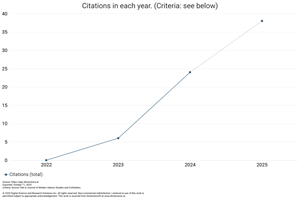Holistic classical interpretation: Analysis of Halal and Haram in Food made from processed fruit from the Qur'an perspective
DOI:
https://doi.org/10.59653/jmisc.v1i03.1526Keywords:
Halal and Haram, food, processed fruitsAbstract
Considering the importance of legal clarity regarding halal (permissible) and haram (forbidden) matters in Islamic law, especially concerning food consumption, and the growing popularity of processed fruit products among the community, this research becomes crucial to discuss. This holds significant relevance in the lives of Muslim individuals. While the Quran provides clear guidance on what halal and haram are, a holistic understanding of classical Quranic exegesis can offer a deeper and more relevant insight into the context of modern life. The analysis focuses on the processing of fruits, considering the materials and methods used. Evaluation is conducted based on the halal criteria outlined in classical exegesis. This research employs a literature review and Quranic exegesis analysis method to scrutinize the concepts of halal and haram in processed fruits from the perspective of the Quran, utilizing a holistic approach to classical exegesis. The expected outcome of this study is to contribute to Islamic literature and practice by integrating classical exegesis concepts into the understanding of halal and haram in processed fruit products.
Downloads
References
Adinugraha, H. H., Sartika, M., & Ulama’i, A. H. A. (2019). Halal lifestyle di Indonesia. An-Nisbah: Jurnal Ekonomi Syariah, 5(2), 57–81.
Al-Mawardi, A. bin H., & bin Habib, M. (1982). An Nukat wa Al Uyun Tafsir Al Mawardi. Kuwait: Wizarat Al Auqaf Wa As Syuâ€TM Un Al Islamiyah.
Al-Qarḍāwī, Y. (1985). al-Ḥalāl wa al-ḥarām fi al-Islām. Dār al-Maʻrifat.
Andriyani, A. (2019). Kajian literatur pada makanan dalam perspektif islam dan kesehatan. Jurnal Kedokteran Dan Kesehatan, 15(2), 178–198.
As-Sirjani, R. (2011). Sumbangan peradaban Islam pada dunia. Pustaka Al Kautsar.
Aziz, N., Bakry, N., Mz, M. H., & Armia, M. S. (2023). The paradigm of modern food products and its relevance with the concept of food in the Quran. Heliyon, 9(11), e21358. https://doi.org/10.1016/j.heliyon.2023.e21358
Daud, I. (2018). Surga di dalam Hadis (Menemukan Pesan Moral Dibalik Keindahan Surga). Farabi: Jurnal Pemikiran Konstruktif Bidang Filsafat Dan Dakwah, 18(2).
Diniati, A. (2024). Penafsiran ayat-ayat tentang kebahagiaan menurut Asy-syaukani dalam tafsir Fathul Qadir. UIN Sunan Gunung Djati Bandung.
Faqih, M. I. (2021). Konstruksi Pemikiran Madzhab Asy’ari dalam Tafsir Jalalain. Aqwal: Journal of Qur’an and Hadis Studies, 2(2), 300–319.
Fiantika, F. R., Wasil, M., Jumiyati, S., Honesti, L., Wahyuni, S., Mouw, E., Jonata, Mashudi, I., Hasanah, N., Maharani, A., Ambarwati, K., Noflidaputri, R., Nuryami, & Waris, L. (2022). Metodologi Penelitian Kualitatif (1st ed.). PT. Global Eksekutif Teknologi.
Fitri, L. (2018). Konsistensi Konsumen dalam Mengkonsumsi Produk Halal: Suatu Kajian literatur. JURNAL VISIONER & STRATEGIS, 7(2), 101–107.
Hoseininia, S. M. R., & Mahdi Mahmoudi, M. (2023). Qurtubi’s Approach in Facing the Difference of Recitations (Qira’at) in Tafsir al-Jami’li Ahkam al-Quran. 5-QERA’T, 10(19), 178–209.
Kashim, M. I. A. M., Haris, A. A. A., Mutalib, S. A., Anuar, N., & Shahimi, S. (2022). Scientific and Islamic perspectives in relation to the Halal status of cultured meat. Saudi Journal of Biological Sciences, 30(1), 103501. https://doi.org/10.1016/j.sjbs.2022.103501
Mairinda, A. (2021). Berkenalan Dengan Jaminan Produk Halal di Indonesia. Guepedia.
Mulizar, M. (2014). Makanan dalam alquran (studi terhadap tafsir al-Azhar). Pascasarjana UIN Sumatera Utara.
Rohman, A., Durachman, A. J. R., & Zulaiha, E. (2022). Menelisik Tafsir Al-Jâmi’Li Ahkâm Al-Qurân Karya Al-Qurthubi: Sumber, Corak dan Manhaj. Jurnal Kawakib, 3(2), 95–108.
Saputra, H. M., Nanda, T. D., Apriyadi, R., Henri, H., & Setiawan, F. (2023). Keanekaragaman hama lalat buah pada tanaman sayuran buah di kabupaten bangka dan kunci identifikasinya. Jurnal Agrotek Tropika, 11(4), 705–716.
Satria, A. D. (2021). Makanan Halal Perspektif Majlis Ulama Indonesia (Mui) Di Kota Palangka Raya. Profetika: Jurnal Studi Islam, 22(2).
Thawilah, A. W. A. (2010). Fikih kuliner. Pustaka Al-Kautsar.
Trianto. (2007). Wawasan ilmu alamiah dasar: perspektif Islam dan barat. Prestasi Pustaka.
Umar, A. M. (2000). al-Mu’jam al-Arabi al-Asasi. Saudi ‘Arabiyyah: Jamiah Al-Duwal Al-Arabiyyah: Al-Munazzamah Al-Arabiyyah Li Al-Tarbiyyah Wa Al-Thaqafah Wa Al-Ulum.
Usman, I., Sana, S., Afzaal, M., Imran, A., Saeed, F., Ahmed, A., Shah, Y. A., Munir, M., Ateeq, H., Afzal, A., Azam, I., Ejaz, A., Nayik, G. A., & Khan, M. R. (2023). Advances and challenges in conventional and modern techniques for halal food authentication: A review. Food Science & Nutrition, 12(3), 1430–1443. https://doi.org/10.1002/fsn3.3870
Downloads
Published
How to Cite
Issue
Section
License
Copyright (c) 2023 Delsi Amelia Putri, Miftahul Jannah, Khaoiriratal Jamiah, Ali Akbar

This work is licensed under a Creative Commons Attribution-ShareAlike 4.0 International License.
Authors who publish with this journal agree to the following terms:
- Authors retain copyright and grant the journal right of first publication with the work simultaneously licensed under a Creative Commons Attribution-ShareAlike that allows others to share the work with an acknowledgement of the work's authorship and initial publication in this journal.
- Authors are able to enter into separate, additional contractual arrangements for the non-exclusive distribution of the journal's published version of the work (e.g., post it to an institutional repository or publish it in a book), with an acknowledgement of its initial publication in this journal.
- Authors are permitted and encouraged to post their work online (e.g., in institutional repositories or on their website) prior to and during the submission process, as it can lead to productive exchanges, as well as earlier and greater citation of published work (See The Effect of Open Access).
























